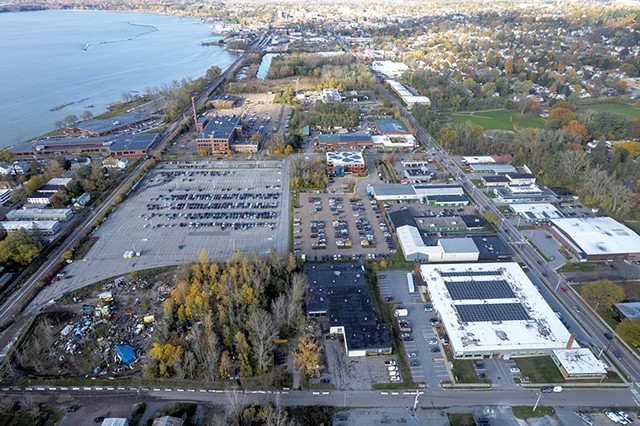
- File: James Buck
- Some of the proposed zoning district in November 2021
The “South End Innovation District” was once zoned for light manufacturing and industrial use. It comprises 14 mostly vacant pieces of land on the west side of Pine Street, including the Hula campus on Lakeside Avenue, a nearby six-acre parking lot owned by Hula developer Russ Scully and a city-owned parcel on Sears Lane.
Mayor Miro Weinberger, who proposed the zoning change more than 18 months ago, said the new rules will spark housing development in a city that doesn't have enough of it.
"We are in this crisis, in many ways, because we have made housing way too hard to build in this city, in this state and in many parts of this country," the mayor said. "We have the opportunity to implement one of the more dramatic fixes that we will ever have the chance to do together."
The new zoning aims to create a walkable neighborhood in the city’s desirable South End. Buildings must be close to the streets, and the lots they sit on must leave room for green space. Surface parking lots are discouraged.
Related Concerns About Building Height Reemerge With Zoning Proposal for Burlington’s South End

At a press conference earlier on Monday, Weinberger said he doesn’t think that lowering the height limit in that one area detracts from the overall goal of increasing the city’s housing stock.
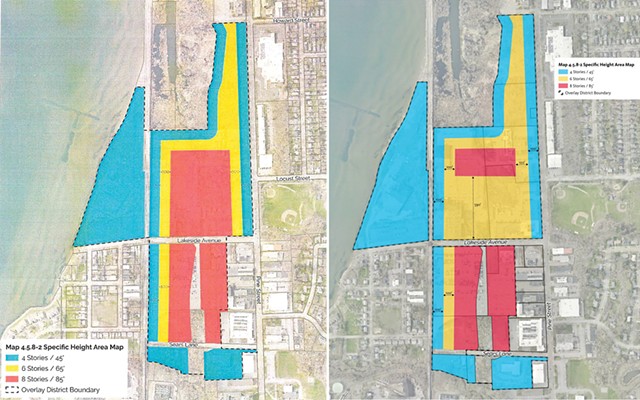
- City of Burlington
- The original height map (left), and the one approved by councilors
Councilor Zoraya Hightower (P-Ward 1), who introduced the amendment, said that loophole should be closed. Her colleagues agreed, voting unanimously to preclude developers from using the so-called "payment-in-lieu" option.
There was less consensus on whether to allow dormitories and hotels in the new district.
Councilor Joan Shannon (D-South District) took the lead on dorms, moving to strike them from the list of permitted uses. She argued that allowing dorms would encourage colleges and universities to increase enrollment while not committing to housing students for all four years — a concern that was also raised in a debate to rezone the University of Vermont's Trinity Campus for more student housing.
Related Gowntown Development: UVM Wants to Build Dorms on Its Trinity Campus. Would That Ease Burlington’s Housing Crisis?: Locked Out Series, Part 5

Shannon's motion failed on a 6-6 tie vote, meaning dorms are allowed in the new district.
Traverse was also in favor of allowing hotels in the district but only south of Lakeside Avenue and only one per lot. Hotels were part of the original proposal but were nixed during council subcommittee discussions.
Councilors were similarly mixed on the question, with proponents — including Mayor Weinberger — arguing that hotels could complement future housing in the district, while opponents said housing should be the priority. The motion failed on a 7-5 vote, meaning hotels are not allowed in the new district.
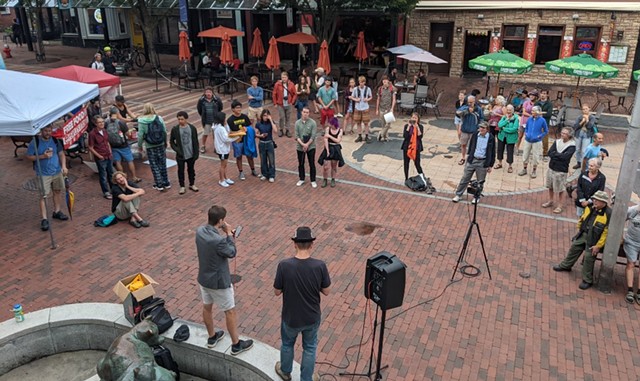
- Courtney Lamdin ©️ Seven Days
- A climate rally on Monday
The resolution — sponsored by three Progressive councilors and Democrat Hannah King (Ward 8) — urges the Guard to keep track of its carbon emissions, to use more flight simulations in lieu of flying F-35 fighter jets, and to "take any other such measures as needed" to reduce or eliminate greenhouse gas emissions by 2030.
The measure passed unanimously but is nonbinding, meaning the Guard can abide by it or ignore it.
In 2019, Burlington pledged to be net-zero by 2030, but that goal notably didn't include emissions from the Patrick Leahy Burlington International Airport or the Guard base next door. The resolution includes a “conservative estimate” that F-35 training missions emit more than 100,000 tons of carbon dioxide each year.
The resolution draws on the U.S. Air Force's own acknowledgement of the problem. The military branch's 2022 climate action plan calls climate change an “existential threat” to U.S. security and suggests increasing “the use of simulation and augmented reality systems” to cut down on fuel use.
Climate activists held a rally outside Burlington City Hall before Monday’s meeting to urge councilors to pass the resolution. They pointed to recent catastrophic flooding as evidence that climate change can’t be ignored. Many spoke during the meeting's two-hour public forum.
Related Burlington Asks Residents to Conserve Water After Sewer Pipe Breaks
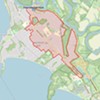
The city discovered the break on July 12, two days after a massive flooding event caused the Winooski to rise and swell. Since then, the city has been using pumper trucks to haul wastewater to the North Plant to be treated, a move that officials estimate will cost about $210,000. Residents in a large portion of the New North End have been asked to dial back their water use until the pipe is repaired.
Public Works Director Chapin Spencer said a temporary bypass pipe could be finished by Tuesday. That work will cost about $550,000. Divers will be brought in to assess the condition of the broken pipe but are waiting for river conditions to improve, Spencer said.
Related Burlington Woman Dies After Fall Into Huntington River

Paul called Katie's loss "immeasurable."
"A family is mourning and grieving the loss of their loved, and truly beloved, child," Paul said. "In a small community such as ours, one life impacts so many other lives."
A funeral mass for Katie is scheduled for 10 a.m. on Wednesday at St. Mark Catholic Church on North Avenue in Burlington. A reception at the Elks Club on North Avenue will follow interment at Resurrection Park cemetery in South Burlington.

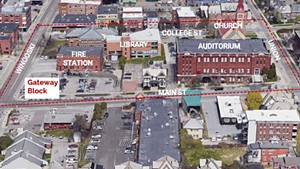

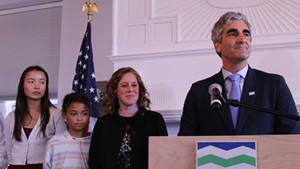










Comments
Comments are closed.
From 2014-2020, Seven Days allowed readers to comment on all stories posted on our website. While we've appreciated the suggestions and insights, right now Seven Days is prioritizing our core mission — producing high-quality, responsible local journalism — over moderating online debates between readers.
To criticize, correct or praise our reporting, please send us a letter to the editor or send us a tip. We’ll check it out and report the results.
Online comments may return when we have better tech tools for managing them. Thanks for reading.